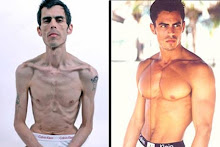Thanks to a link provided by BamaGal, I came across this brilliant post by "LC" on the blog, Grilled Cheese Sandwich with Pickles (link:
http://grilledcheesewithpickles.blogspot.com/2007/11/kimkins-debunked-myth-1.html):
Kimkins Myth #1: You can't starve if you have body fat
First, let me make this very clear: I am not a medical doctor. Nothing I write here should be construed in any way, shape or form as medical advice. However, I do have a doctorate in Biochemistry. That doesn't make me smarter than Kimmer and her minions it just ... nah. It makes me smarter than them :)
One oft-repeated claim by everyone's favorite discredited diet guru is that so long as you have an ounce of body fat on you, you will not starve. In fact, this individual claims there is no such thing as starvation mode, a statement she is uniquely unqualified to make. Nonetheless, on the face of it, this seems like it could make sense. If you don't eat, or severely restrict your calories, your body will naturally burn its own fat, and only its own fat, to make up the deficit, right?
Wrong.
Most people have an idea of what happens in hypothermia and frostbite -- the body shunts blood flow away from your extremities in an effort to preserve the brain and vital organs. You can live without fingers or toes, but you cannot live without a brain. Well, most people can't live without a brain. Your body will always, always prioritize functions in a way that ultimately preserves life.
If you enter a state of starvation or semi-starvation you will start burning body fat for fuel. But, and this is a big but, you will also begin to cannabilize your lean muscle mass at the same time. Yes, if you are obese you are going to 'burn' proportionally more fat for fuel than a lean person would, but you are most assuredly going to lose some muscle mass as well. Starvation isn't just about how many calories you consume, it also involves derangement of normal metabolism. If your body is consuming lean muscle as an energy source .... well, you're starving.
Why? Because muscle requires calories to maintain itself. One pound of muscle requires approximately 50 calories per day to maintain itself, as opposed to 2 calories a day to maintain a pound of fat. Your body has no idea whether or not you're eating 500 calories a day because you want your ex-husband's new wife to be jealous of your hawt new figure or because there was a massive natural disaster which wiped out most/all of the available food supplies, and it doesn't care -- the end result is the same. Your body will do whatever it can to preserve the only food supply it can count on -- its fat stores -- as best it can. Because muscle requires so many calories to maintain, it will reduce the amount of lean muscle mass as much as it can while preserving life in an effort to reduce the overall number of calories you need to stay alive.
May I just point out that consuming protein does nothing to prevent this.
An example -- suppose you are an individual weighing 200 lbs. You have undergone some fancy tests which reveal that 120 of those lbs represent lean body mass (which includes muscle/bone/organs) and the remaining 80 lbs is body fat. Now, suppose you know that of that 120 lbs of lean body mass, 60 lbs of that represents muscle. That 60 lbs of muscle will require approximately 3000 calories a day to maintain itself whereas the 80 lbs of fat will only require 160 calories to maintain itself.
Oh, Pshaw! Grilled Cheese Sandwich with Pickles Lady, you may be saying. Why should muscle require so many more calories to maintain itself? Because, dear reader, muscle is a lot more complicated than adipose tissue. A single muscle cell, called a myocyte, consists of many, many myofibrils which have a fairly complicated architecture and synthesis, which undergoes constant maintenance and repair in order to stay in working order. A single fat cell, called an adiptocyte, consist of a basic cell with a glob of lipid in it. It requires almost nothing by way of maintenance. Furthermore, muscle is a better source of ATP (adenosine triphosphate, a molecule which all your cells use for energy, and which is synthesized from carbs, fats and proteins) than fat.
Now, suppose you're absolutely desperate and pay a morbidly obese woman a cool $60 to join her diet site, even though there is no indication anywhere that she ever successfully applied it it herself. This diet bills itself as a tweaked version of Atkins and Stillman's, basically keeping carbs at 20 g or less per day, 70-90 g of lean protein, and 'just enough fat to make it work." This diet, at best, permits 760 calories a day based on 20 g of carbs and 90 g protein. Suppose you decide 'just enough fat to make it work' means around 20g on a bad day (that's just under an ounce, BTW) -- well, you've just added 180 calories to your total which means that at the higher end of Kimkins you are consuming just 940 calories per day.
That, dear reader, is 460 calories less than the best meal you'd be served at Auschwitz and frankly, that way lies madness.
LC"
Brilliant? I'd say so.
Please take a moment and check out LC's blog:
http://grilledcheesewithpickles.blogspot.com/2007/11/kimkins-debunked-myth-1.html
Follow on Buzz





























0 comments:
Post a Comment